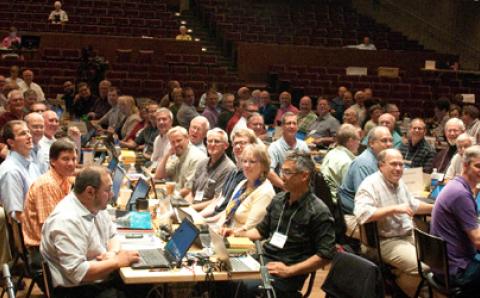Older. Fewer children. Less prayer, Bible reading, and Sunday-evening worship.
The trends are not promising for the Christian Reformed Church based on a new survey of CRC members, but researchers also found signs of hope.
The average CRC worshiper is older, spends less time in private devotions, and has fewer children at home than 25 years ago, according to a major survey presented to synod Monday.
And though loyalty to denomination and church has begun to rebound, it’s still lower among younger members.
All trends point to a need for congregations to rethink their methods and mission if the CRC’s membership decline is to turn around, researchers said.
“The first thing our churches have to do is to ask themselves, what does the Lord want us to do as a congregation?” said consultant Rodger Rice, who helped conduct the study for the Calvin College Center for Social Research. “Every church in this denomination that doesn’t have a clear vision of what God wants them to do, better ask him.”
He and fellow researcher Neil Carlson, director of the CSR, also were concerned that the more income CRC members have, the less they give proportionately to the church. The highest rate of giving is among those 75 and older.
The survey, taken every five years since 1987, involved 2,609 respondents from 102 churches. Among the findings:
- The average age of respondents rose from 46 in 1987 to 53, reflecting the aging of baby boomers;
- Those with children under 18 fell from 47 percent to 35 percent;
- Attendance at Sunday evening services fell from 51 percent to 17 percent;
- Daily family devotions and Bible reading fell from 60 percent in 1992 to under 40 percent.
The latter trend troubled delegate Rev. William Veenstra, Classis British Columbia South-East, along with less use of CRC-produced educational materials.
“Is there a symptom of ongoing death, not just associated with age, but associated with lack of spiritual passion, even in our younger groups?” Veenstra asked.
Rice and Carlson also found reasons for hope in the survey. Respondents placed a high value on Scripture, and a majority felt their church was healthier than five years ago.
Applying a life-cycle model to their congregations, re-casting their visions, and learning from other churches through the CRC’s Healthy Church initiative can help renew churches, they said. So can new “learning modes” employing more children’s messages, storytelling, and drama.
“You can’t make a church younger just by snapping your fingers, but you can tell stories,” Carlson said.
Better engagement with immigrant and ethnic minority churches, the CRC’s fastest-growing segment, also holds promise for future growth, Carlson said later.
“It’s at the grassroots where we really have to do the work of renewal, at the congregational level,” Rice added.
Synod 2013 is meeting at Calvin College in Grand Rapids, Mich. from June 7-14. For continuous Banner coverage of Synod 2013, please follow The Banner on Facebook or @crcbanner on Twitter. You can find more tweeting by following hashtag #crcsynod. News stories will be posted at www.thebanner.org several times daily. For CRC Communications releases, webcast, and live blogging, please visit www.crcna.org/synod. Unless noted otherwise, all photographs are by Karen Huttenga.









